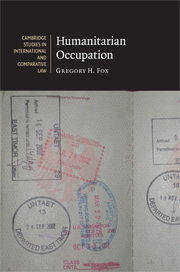Book contents
- Frontmatter
- Contents
- Acknowledgments
- Introduction
- Section I Historical antecedents
- 1 The historical origins of humanitarian occupation I: governance in service of outsiders
- 2 Historical origins of humanitarian occupation II: internationalized territory in service of insiders
- 3 Full international governance
- Section II Why humanitarian occupation?
- Section III Legal justifications
- Conclusions
- Index
- CAMBRIDGE STUDIES IN INTERNATIONAL AND COMPARATIVE LAW
2 - Historical origins of humanitarian occupation II: internationalized territory in service of insiders
Published online by Cambridge University Press: 02 February 2010
- Frontmatter
- Contents
- Acknowledgments
- Introduction
- Section I Historical antecedents
- 1 The historical origins of humanitarian occupation I: governance in service of outsiders
- 2 Historical origins of humanitarian occupation II: internationalized territory in service of insiders
- 3 Full international governance
- Section II Why humanitarian occupation?
- Section III Legal justifications
- Conclusions
- Index
- CAMBRIDGE STUDIES IN INTERNATIONAL AND COMPARATIVE LAW
Summary
Most of the larger United Nations trust territories gained independence by the early 1960s, leaving only island territories under international supervision. As the trusteeship system began to wind down so also did the international community's involvement in territorial administration. The Cold War had not been a major obstacle to decolonizing the trust territories since the Soviet bloc enthusiastically supported liberation movements in the developing world and the US, while not nearly as vocal, provided muted support. But Cold War divisions did preclude administration of territory within sovereign states. Ideologically, the conflict over theories of governmental legitimacy lying at the heart of the East-West struggle made agreement on forms of international administration a virtual impossibility. Politically, many of the developing states that might have been deserving candidates for supervision were mired in proxy wars that neither side was willing to resolve through international administration. As a result, issues of governance were effectively off the multilateral agenda. With a few isolated exceptions they would not return until after 1989.
This chapter focuses on the remarkable surge in international governance missions at the end of the Cold War. Almost everything about these missions differed from the arrangements discussed in the previous chapter. First, they were deployed to sovereign states. Unlike the colonial territories under mandate and trusteeship, or the European territories briefly administered after World War I, the states hosting these missions possessed full juridical rights over their territories. Each of the post-Cold War missions thus required a superseding legal justification. These came in two forms: consent by the host government and a resolution of the Security Council under Chapter VII of the UN Charter.
- Type
- Chapter
- Information
- Humanitarian Occupation , pp. 41 - 71Publisher: Cambridge University PressPrint publication year: 2008

